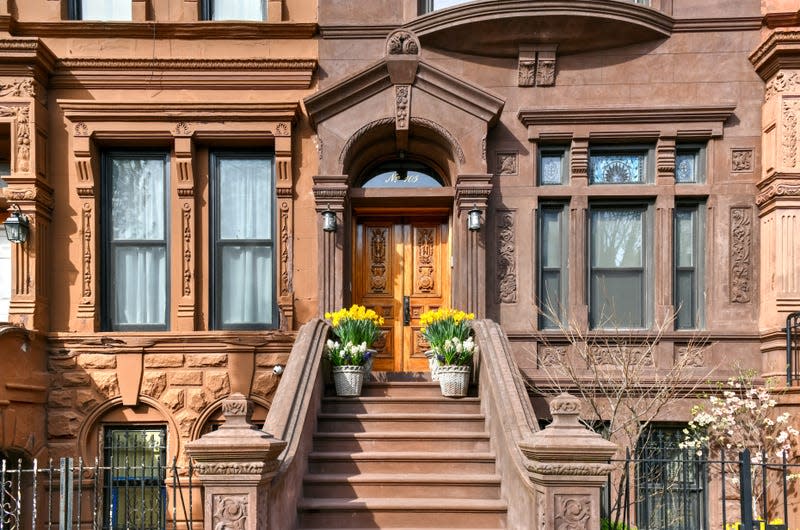Real Estate Godfather of Harlem Explains How To Buy A Home and Gain Wealth

- Oops!Something went wrong.Please try again later.
Brownstone buildings in Harlem in Manhattan, New York City.
Most financial advisors will tell you that owning property is one of the best ways to create generational wealth. But in cities like New York and Los Angeles, rising housing costs and interest rates can make owning even a closet seem out of reach and leave long-term renters like me feeling hopeless.
But before giving up on the idea of owning a home, I wanted to ask an expert what I could do to get myself a little piece of the American dream. So I sat down with real estate executive and author of “The Real Estate Godfather of Harlem,” Jarrod Whitaker.
Read more
Switch 2 Could Look Like One Of Nintendo's Classic Handhelds
Report: Destiny 2's Climactic The Final Shape Expansion And Marathon Shooter Delayed
2023 Is The Best Year For Games In A While (And Maybe Ever?)
Apple's 'Scary Fast' Event: How to Watch and What to Expect (New Macbooks and More)
“I was like, ‘I can’t sleep on couches. I have to pay rent and have health insurance.’ So I started working as a mailroom clerk for a private equity firm,” he said.
But Whitaker wasn’t just delivering packages and lunches. He used his position to tap into the wealth of knowledge around him.
“I was very interested in real estate and started asking questions. And the one Black partner in the firm took a liking to me and let me start interning after my normal shift,” he said.
Knowledge is Power
Whitaker credits his mentors with educating him on the real estate game and giving him the tools he parlayed into a successful career in the industry. And while he recognizes that everyone may not be lucky enough to have an expert at their disposal, Whitaker suggests taking advantage of credible resources available on the internet to educate yourself on best practices and sharing what you’ve learned with other members of your community.
““I don’t think anybody arrives at a place of success by themselves. We have key people who open doors, create social capital and opportunities.” he said. “Now, we’re in an era where everyone has a smartphone, so the information is right at our fingertips. And so it’s important to execute on those strategies and pull up our counterparts.”
Get “It” Together
More Americans own homes today than they did a decade ago. But the gap between Black homeownership rates and that of other racial/ethnic groups continues to grow. According to the National Association of Realtors, the homeownership rate is nearly 73 percent for white Americans and only 44 percent for Black Americans.
And while we can look to systemic issues like redlining and discriminatory lending practices, we can’t ignore the fact that gentrification is happening in previously neglected areas like Harlem, where people of color are being priced out. According to census data, Harlem’s Black population decreased by over 10,000 between 2010 and 2020, while the number of white residents increased by nearly 19,000.
But Whitaker says people shouldn’t let rising costs keep them from their dream and suggests cooperative economics and specialized lending programs as strategies to overcome the challenges.
“Black people in America have $1.8 trillion in spending power every year. We need to come together and pool our resources to create communities and guide that Black dollar,” he says. “It’s difficult because the price of real estate has gone up exponentially and interest rates are high. But you should establish a good credit score and use vehicles like an FHA loan that allow you to put down as little as 3.5 percent. There are great programs like NACA and the Community Reinvestment Act that give down payment and closing cost assistance to people of color from communities that historically were blighted and redlined by commercial banks.”
Make Your Investment Work For You
You may have dreams of a white picket fence and acres between you and your closest neighbor. But Whitaker suggests starting with a property that allows you to generate rental income.
“The first property you move into doesn’t have to be your dream home. With an FHA loan you can get anything from a 1 - 4 family property,” he said. “You can buy a multi-unit home, live in one unit and rent the others out. Under the IRS tax code, you can write off taxes and certain expenses on both your primary and secondary residences.”
Pay it Forward
Whitaker knows he wouldn’t be where he is today without the help of those who took time to mentor him. Now he’s doing what he can to help the next generation. As a mentor at the Boys and Girls Club of Harlem, Whitaker educates kids on financial literacy, credit repair and entrepreneurship. “It’s really about giving them exposure at a young age so they have ammunition and resources that we didn’t have.”
More from The Root
Tesla Fanatics Melt Down Over Model Y Owner Who Added Buttons To Touchscreen
Man Arrested For Renting $1M In Cars, Washing The Titles And Reselling Them
Sign up for The Root's Newsletter. For the latest news, Facebook, Twitter and Instagram.

